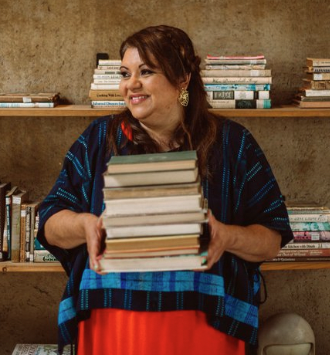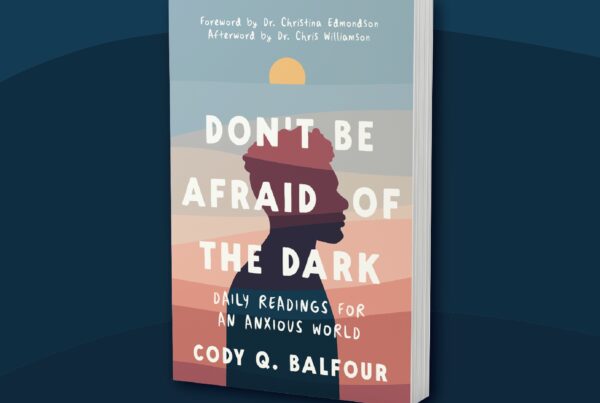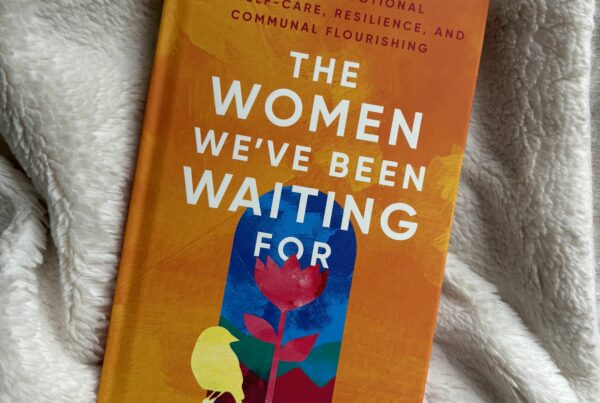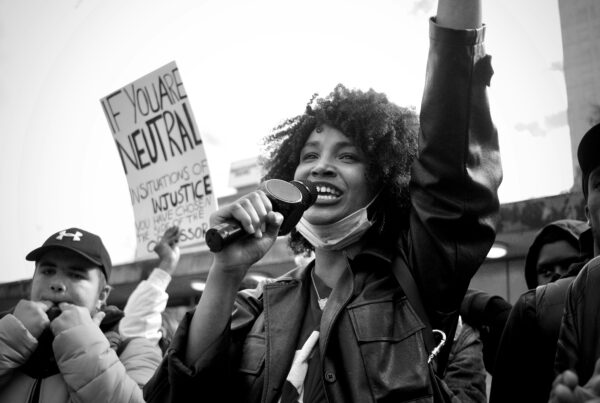The Chasing Justice Book Club will serve the purpose of highlighting BIPOC voices that are doing the courageous work of sharing their experience and expertise while supporting the authors. Join us in the CJ Book Club on Instagram for weekly discussion topics and discourse. The CJ Podcast will also host a monthly Book Club episode with the author to discuss and answer your questions. Enjoy the following excerpt from our November book club selection Beyond Welcome: Centering Immigrants in Our Christian Response to Immigration sponsored by Brazos Press.
From the chapter “An Ethnocentric Faith”
When I was preparing to live abroad, someone told me that all human beings are ethnocentric—that is,
at a subconscious level, or sometimes even consciously, all of us believe that our way of life is the
correct way to live, and thus we view other cultures through the lens of our own. This is inevitable,
because culture functions much like the Tower of London has: it is both a castle, a place we feel most at
home and comfortable, and a prison, a place we cannot see our way out of. “We become certain that
our way of doing things is the proper way, and we are blinded to the possibilities of doing things
differently. . . . The comfort of our community becomes a bias towards others.” The goal, then, is to
admit and accept our ethnocentrism and try to become recovering ethnocentric people.
For many Christians, the challenging part of becoming recovering ethnocentric people is that
most of us do not realize that our expression of faith also carries a culture. We readily admit that being
born and raised in the US or Kenya or Nicaragua has not prepared us to live in other contexts. We
recognize that we will need to learn a new culture and, perhaps, a new language in a new land.
However, we seldom realize that we must also learn a new way of seeing faith in other contexts. When
we do not pay attention to how God has been present in another culture and how the Spirit is revealing
God’s very self in local cultural expressions, we will then impose our own Christian culture on others.
I was guilty of imposing American Christian culture on my Russian and Kazakh friends. I expected
them to read the Bible like I did and see the same things I did within its pages. I expected their
conversions and discipleship journeys to look like the ones I had seen in the US. I expected my Russian
friends to reject the Russian Orthodox Church just as I had rejected the Roman Catholic Church of my
upbringing in favor of a more evangelical tradition. None of this was done maliciously or even
consciously, though it still did a great deal of harm because we diminished and discounted our friends’
experiences of God when they did not look like ours or did not say what we believed were the “right”
things. We expected our friends to conform to a white, American, evangelical faith expression because
that was the faith we brought, even though they were Kazakhs, Koreans, Tatars, and Russians. God had
been with them from the beginning, revealing Godself in ways that are unique to their cultures. These
unconscious expectations were reinforced by everything around me: the foreign church plants; the
attitudes of the missionaries I knew; the worship songs, whose lyrics had been translated from English;
and the hopes and expectations of supporters back home.
Afro-Caribbean scholar Frantz Fanon describes this phenomenon with incisive clarity as he
writes about the faith that French colonizers and missionaries brought to Algeria and Haiti: “The church
in the colonies is the white people’s Church, the foreigner’s Church. She does not call the native to God’s
ways but to the ways of the white man, of the master, or the oppressor.”
There is perhaps no better recent example of Christians’ lack of awareness about their
ethnocentric faith transmission than American author and pastor John MacArthur’s assertion that Latin
American people do not know Christ. In a video lecture from the Por Su Causa Conference in 2016, Mac-
Arthur says, “We all understand that people in the Hispanic world know about Jesus Christ, they know
about the Bible, they know about God, they know about salvation, at least in some ways, . . . but they
don’t know Christ. And they don’t know the gospel of grace, and they don’t know the full revelation of
Scripture.” Discounting the very real presence of the Roman Catholic Church since the conquistadors
arrived in the Americas in the 1500s, as well as the exponential growth of the Pentecostal Church
throughout the region, MacArthur seems to be saying that he does not believe Latin Americans are
Christians because their faith expression doesn’t look like his.
While MacArthur’s views are uncommon, they do reveal an uncomfortable and pervasive truth:
many of us believe that the way we live out and practice our faith is the only correct way. It is not
difficult to see why many people found MacArthur’s comments offensive and racist. What is more
difficult to see is how an ethnocentric faith can be dangerous. When Southern Baptist leader Paige Patterson returned to the pulpit after being fired as president of a seminary for making misogynistic
comments and mishandling sexual abuse allegations, he preached on the story of Joseph and Potiphar’s
wife in Genesis.
Joseph is a Jewish patriarch who was falsely accused by an Egyptian woman of sexual assault.
Addressing the #MeToo movement, Patterson says, “I have nothing good to say about a woman who
falsely accuses a man. She runs the risk of ruining a life. She runs the risk of causing sorrow unknown
when the person is, in fact, innocent.” He seems to believe that many women lie about sexual
harassment and assault (when in fact, statistically, the vast majority of women are telling the truth), and
he also implies that his own situation is similar to Joseph’s. But is that comparison fair?
Joseph was a vulnerable teenage foreigner in Egypt. He had no power, no friends, and no
influence. In fact, Genesis says over and over that only God was with Joseph. Joseph had been trafficked
by his brothers and was an enslaved person in the home of Potiphar, the captain of Pharaoh’s guard. It
was in this state that his enslaver’s wife sought to seduce him and then falsely accused him when he
refused her advances. Potiphar had him thrown into prison for this false accusation.
In contrast, Patterson is an educated adult white man with a lot of social and institutional
power. He was given a pulpit even after a very public employment termination for misogynistic
comments he made on the record and for his failure to protect vulnerable people by mishandling abuse
allegations. He had many defenders along the way. Rather than being thrown in jail after his accusers
came forward, he simply left his job and moved on to other teaching opportunities. In some circles, not
even his reputation has suffered.
Patterson and Joseph have so little in common that one wonders why the two would ever be
mentioned in the same sentence. Patterson might see himself as Joseph, but were he to read his Bible
from the perspective of his accusers, he would see that if he is anyone in Joseph’s story, it is
Potiphar—the one who refused to listen to Joseph and had him thrown in prison. He is the one who did
great harm to people in vulnerable situations, not the one who suffered harm.
Like Patterson, many of us read the Bible from an ethnocentric perspective. We make ourselves
the heroes and underdogs of the story rather than understanding our true location in the text. And so
we see ourselves as Moses and not Pharaoh, as Mary Magdalene and not Pontius Pilate, as the
persecuted first-century church and not the Roman Empire, as Esther and not Haman. Patterson saw
himself as Joseph, the victim of injustice, and thus did not see the real victims: those who had suffered
sexual abuse and those who were harmed by misogyny. His theological conclusions are dangerous
because not only do they not lead to seeing rightly and repenting, but they also do great harm to God’s
children.
Ethnocentric Bible reading is so common that it is often difficult to recognize. One of the most
prevalent examples in the American church is the response many Christians have when they read in the
Bible about God’s call to the rich and powerful to care for and serve the poor. Most people see
themselves as the poor person and not the ones with social power, resources, and a safety net. It seems
that for many of us in the West, the rich are only people like Bill Gates, Jeff Bezos, or the British royal
family, and never people like us: those who have the funds to go to nice restaurants, travel on vacation,
remodel our bathrooms, and buy a car. I believe this to be the reason that many people say we should
take care of our own in need, such as military veterans and people experiencing homelessness, rather
than welcome refugees and other immigrants. Bible interpretations that lead us to conclude that we are
the poor and not the rich have terrible consequences for our neighbors who are marginalized, since they
lead us to justify the harm done to them when we deny them entry to our countries. The implication is
that countries are poor, and there is a scarcity of resources rather than an abundance. In fact, we can
choose to care for all who are in need because there is more than enough for all of us, if we allocate
resources in a way that prioritizes the well-being of people in vulnerable situations.
Content taken from Beyond Welcome by Karen González, ©2022. Used by permission of Brazos Press. All rights reserved. No part of this excerpt may be reproduced or reprinted without permission in writing from the publisher.

Karen González is a writer, speaker, and immigrant advocate who emigrated from Guatemala as a child. She attended Fuller Theological Seminary, where she studied theology and missiology, and she has worked in the nonprofit sector for thirteen years. In addition to her first book, The God Who Sees: Immigrants, The Bible, and the Journey to Belong, González has written for Christianity Today, Christian Century, Sojourners, and the Baltimore Sun. She lives in Baltimore, Maryland. Karen is the co-host of the Latina-focused podcast Cafe with Comadres. You can reach her via her website Karen-Gonzalez.com or on Twitter and Instagram.
The views and opinions expressed on the Chasing Justice Blog are those of the authors and do not necessarily reflect the official policy or position of Chasing Justice. Any content provided by our bloggers or authors are of their opinion and are not intended to malign any religion, ethnic group, club, organization, company, individual or anyone or anything.







